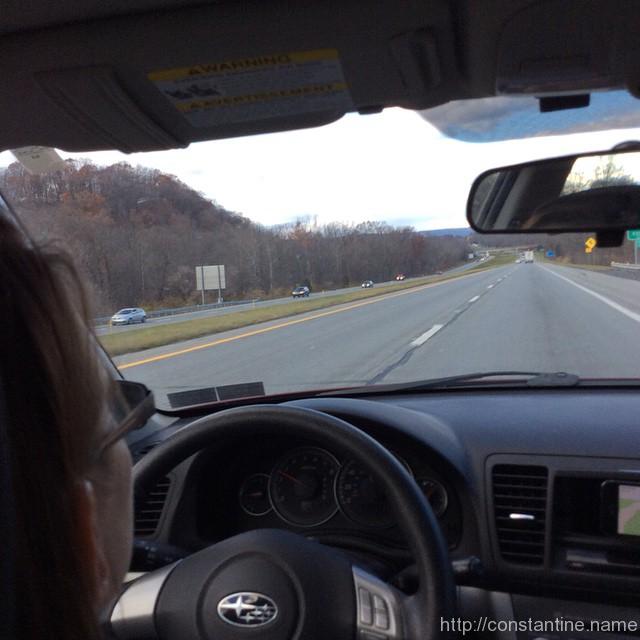Of the ones who have nothing to say, the quiet ones are the most pleasant.
~ Michel ‘Coluche’ Colucci
slip:4a1478.
Of the ones who have nothing to say, the quiet ones are the most pleasant.
~ Michel ‘Coluche’ Colucci
slip:4a1478.
[A]s I write I think about all sorts of things. I don’t necessarily write down what I’m thinking; It’s just that as I write I think about things. As I write, I arrange my thoughts. And rewriting and revising takes my thinking down even deeper paths. No matter how much I write, though, I never reach a conclusion. And no matter how much I rewrite, I never reach the destination. Even after decades of writing, the same still holds true.
~ Haruki Murakami
slip:4a1331.
But it’s also just fun. For me, at least. I enjoy seeing how humans from thousands of years ago tried to get their bearings in the world compared to humans living today. When you read, study, and talk about philosophy, you’re taking part in a conversation that’s been going on for millennia. And conversation is fun. I love a good conversation.
~ Brett McKay from, The Philosophy Textbook Every Man Should Own
slip:4uaoli1.
It’s been a minute since I’ve purchased a textbook. It’s nice to see that they’re no longer stupidly over-priced— oh wait, no sorry. They’re insanely priced. Fortunately, I was able to bop on over to abebooks.com and find a copy of The Great Conversation for about $5 depending on what condition you want; There’s like a hundred copies of that book available.
ɕ
In this moment, we need to be reminded that stories of the future—about AI, or any kind—are never just about technology; They are about people and they are about the places that those people find themselves, the places they might call home and systems that bind them all together.
~ Genevieve Bell
slip:4a648.
Zettelkasten is usually mentioned as a note-taking method. However, the end goal of Zettelkasten is not gathering and collecting notes, but rather creating a competent and knowledgeable communication partner. The main interaction with the slip-box is not when we are writing and adding new notes, because the slip-box is not there to be an archive of our memory and knowledge. Slip-box is there to be an apparatus with which we think. Therefore, the main interaction is when we communicate with the slip-box by confronting ourselves and our thinking with our prior knowledge.
~ Eva Thomas from, Understanding Zettelkasten — What does it mean to communicate with the slip-box
slip:4umeeo1.
This appears to be part four of a series: On knowledge systems, Push and pull, and Commonplace notebooks. Depending where you are on your personal journey you may have been sitting back, chuckling, waiting for me to “discover” zettelkasten. …to which I reply, “y u no email me about zettelkasten?!”
Now this idea I definitely have seen before. I can recall stumbling on the idea very early in my personal productivity and self-awareness journey. Without looking, I’ll bet I found it first on 43 Folders. I had the distinct pleasure of following along through Merlin Mann’s journey—trying to keep up, but not succeeding at the time. (Posts on that site run from 2004, through 2011.) If you just went, “43 Folders? …what’s that?” You need to go look at 43 Folders.
…oh sorry, I was off on a tangent there. I just realized Mann has a podcast that’s on episode #503. Shit. Another thing I probably need to listen too. I’ll just say: My web site serialize tool can drip podcast show notes pages at me too, so I’ll drip all those so I can skim the show notes, and I’ll just listen to the few that are “must listen” [in my opinion of course.]
*shudder* I’m all over the map today. Zettelkasten, right.
When I first encountered it, I got stuck on the idea that it’s “notes” in “boxes.” Why would anyone want to do that, now that we have (back then) web sites where you can tag stuff, search, edit, etc.? Now I see this part—trimming my lead quote down—is the neat part:
The end goal of Zettelkasten is creating a competent and knowledgeable communication partner. The slip-box is there to be an apparatus with which we think. Therefore, the main interaction is when we communicate with the slip-box by confronting ourselves and our thinking with our prior knowledge.
Do you see it now? The slip-box system can be slips of paper, digital notes/files, or many other implementations. The original slip-boxes (physical things, pre-Internet… actually, pre-electricity,) were used by one person. Using modern technology we can implement one that allows people to collaborate too. (If we wanted. Not saying I necessarily want that.)
Oh, and guess what I built four years ago. A very complicated, (that’s not a compliment,) system for weaving together references, summaries, and articles on a site called Hilbert’s Library. It was literally my first attempt to build a knowledge management system. I’m now thinking it’s over-designed—I mean yes, sure… I over-think and over-design everything. But I mean that now I see why the design I built into it actually gets in the way of it being maximally useful as a knowledge management system.
What? Oh, yes, people have built lots of ways to implement slip-boxes. Notably, Emvi does that (among other things, because zettelkasten can be confusing so they pitch it in various use cases.)
ɕ
slip:1b1
The artist and the entrepreneur (and all of us on the soul-level) live in an uncertain world. Our trade is in ideas, but who can say where the next one is coming from—or even if there will be a next one?
~ Steven Pressfield from, Humility
There’s a wonderful quote from John Gardner or somebody that, alas, I can’t find. The bad paraphrase goes something like this: …
slip:4usehu1.
Yes, I left out the best part to make you click through to his site.
It seems there are three choices:
Of course, there’s an infinite range of coloring on those axis. But I think my point is clear. I spent a lot of time over in zone 1; that didn’t work out well (for me or anyone else.) I’m disqualified from zone 2; there are simply too many things I’ve done.
Which leads to the problem: Over in zone three, one would necessarily want to sacrifice everything else to nurture the idea. That way lies madness, I think.
ɕ
On Castbox.fm — Adam McClellan, Caitlin Pontrella, & Alan Tran | Art of Retreat
What makes Art of Retreat a transformative experience for community leaders and organizers?
Leaders gather to exchange ideas, solve problems, and shape the future of Parkour communities.
It’s been kind of special to wake up in the morning and have it be peaceful and quiet and more nature oriented. And I think that’s changed the vibe in a certain way which has been pretty valuable.
~ Adam McClellan (0:37)
Art of Retreat, held in the Cascade Mountains, brings together leaders, educators, and organizers to foster collaboration and growth in the Parkour community. The setting contrasts with previous urban locations, providing a peaceful and cohesive environment for attendees to engage deeply with one another. A significant focus of the event is creating a space for problem-solving, leadership development, and community building, with sessions addressing topics like business practices, sports psychology, and story branding.
When I think about stand-out experiences from the weekend, honestly, it was— …while the talks, obviously, are the key elements, the things that really resonated with me were the things beyond that: The community building, and getting a sense of group-making and cohesion.
~ Caitlin Pontrella (2:52)
Attendees value the social aspects and shared experiences beyond the formal talks, such as night missions, treasure hunts, and cabin activities. The organizers emphasize the importance of a diverse speaker lineup, often through an application process, ensuring a wide range of voices and perspectives. Challenges like travel logistics and expanding the event’s duration are under consideration to enhance the experience further. The event continues to grow in geographic reach and influence, drawing participants from international locations and various parts of North America.
Takeaways
The impact of location — A shift to the Cascade Mountains enhances cohesion and creates a peaceful, reflective environment.
Cohesion and connection — The retreat format allows for deeper group bonding and social interaction beyond formal sessions.
Community-focused programming — The event emphasizes leadership, education, and business aspects of Parkour, filling gaps left by other events focused solely on physical practice.
Diversity of voices — A mix of invited speakers and open applications ensures a broad range of perspectives and expertise.
Importance of informal moments — Activities like treasure hunts, night missions, and shared meals foster community and collaboration.
Expanding reach — The conference attracts attendees from across North America and internationally, reflecting its growing influence.
Future improvements — Plans include addressing travel logistics, adding additional days for decompression, and increasing focus on leadership and team-building topics.
Event co-creation — Volunteers, sponsors, and venue staff play crucial roles in the event’s success, highlighting the collaborative nature of the retreat.
Resources
Parkour Visions — A supporting organization that contributed to the event’s success and logistics.
Firestorm Freerunning — Sponsored the event and provided community support.
Axiom Parkour — Partner organization contributing to workshops and sessions.
YMCA Camp Lake Wenatchee — The venue for the retreat, providing a scenic and well-maintained environment for the conference.
Movers Mindset — Craig’s platform involved in recording and sharing content from the retreat.
(Written with help from Chat-GPT.)
ɕ
This is an instance of what philosophers call testimony. It’s similar to the sort of testimony given in a courtroom, but it’s less formal and much more frequent. Testimony happens any time you believe something because someone else vouched for the information. Most of our knowledge about the world is secondhand knowledge that comes to us through testimony. After all, we can’t each do all of our own scientific research, or make our own maps of distant cities.
~ Regina Rini from, How to Fix Fake News
This is a nice introduction to the idea of “testimony.” By saying or writing whatever-it-is-I’m-considering, would I be building up, or tearing down my reliability as a source of testimony?
ɕ
Every morning you have two choices: Continue sleeping with your dreams, or wake up and chase them.
~ unknown
slip:4a459.
If you look to others for fulfillment, you will never be truly fulfilled.
~ unknown
slip:4a565.

off to Boston to visit family, then Albany on Sunday for Parkour with Dylan!
ɕ
 please. PLEASE. No Christmas music before Thanksgiving!
please. PLEASE. No Christmas music before Thanksgiving!
While many people enjoy holiday music — especially people in the northern hemisphere who have warm memories of family and friends — please, PLEASE don’t play it before Thanksgiving.
Seriously. I’ve been making this “NAACMBT” joke for as long as I can remember. (to wit, Skew circa 1995.) I’m now too old for this sh*t, so, up go the web site and FB page. “Waiter, check please!”
ɕ